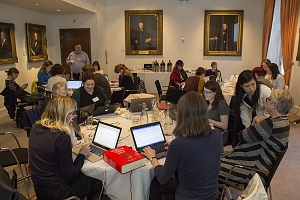On Friday 11th October postdoctoral researcher Dr Megan Dowie participated in a Wikimedia UK Women in Science Edit-a-thon. Hosted at the Royal Society in London and as part of the Medical Research Council Centenary celebrations, the workshop was held to improve Wikipedia articles about women in science.
Coinciding with Ada Lovelace Day, representatives from Wikimedia UK explained how Wikipedia works and supported participants to develop new pages and edit current pages. There was a particular emphasis on women scientists, as they are often poorly represented online and many female Royal Society Fellows were not previously included on Wikipedia.
In acknowledging that Wikipedia is a first source of information for lots of Internet searches, many organisations (such as the Science Museum in London) are embracing this by employing a ‘Wikimedian in Residence’. As an alternative to this model, the edit-a-thon’s aim to train up new editors, especially more scientists. The Royal Society and Wellcome Trust made their library resources open access for the day, as essential sources of biographical information. Anyone can edit Wikipedia, following the guidance of the Five Pillars, including such simple principles as maintaining a neutral point of view. Megan found the day really rewarding and would encourage others to learn how to edit Wikipedia.
This year Ada Lovelace Day is on Tuesday 15th October, and is an international celebration of women in science. Lovelace worked with Charles Babbage, who is credited with inventing the first mechanical computer, while Lovelace herself is often described as the first computer programmer. There are many Ada Lovelace Day events happening; the objective of which is really about helping people “learn about the achievements of women in science, inspiring others and creating new role models”.
Information about future edit-a-thon events is available on the MRC Centenary website.
